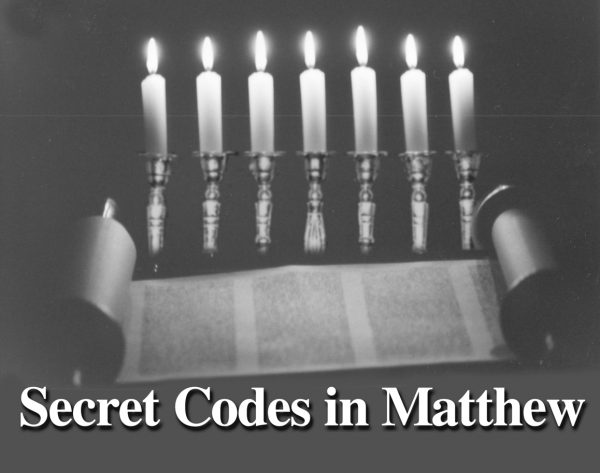The Secret Codes in Matthew: Examining Israel’s Messiah, Part 11: Matthew 16, by Kevin M. Williams

And the Pharisees and Sadducees came up, and testing Him asked Him to show them a sign from heaven (Matthew 16:1).
This section of Matthew can be troublesome. Who among us has not, at some time or another, asked for a sign from God? Yet the intent behind Yeshua’s (Jesus’) words here may help put the matter into perspective.
First, we once again encounter the Pharisees and Sadducees testing the Messiah. We may be lead to ask, “Why do they bother him? Why do they seem to be testing him all the time?”
As we have encountered their challenges before, it is good to remember that while their tests may seem “bothersome,” they were wise in doing so. History records that there were many men rising up in those days claiming to be the Messiah. How would anyone know who he was? There was one way—through testing. If it was important to recognize the Messiah, it was more important to recognize the true Messiah and not fall into deception.
Even a Pharisee who was “the teacher of Israel” (John 3:10, emphasis mine), Nicodemus, tested Yeshua. Yet few look on him with the same distaste they do for other Pharisees.
The conflict here is not so much that they were testing Yeshua, but how they were testing him. It would seem that they wanted Him to perform a sign, such as we might turn on a light switch. This form of “sign seeking,” particularly from God’s chosen people, did not honor God, but rather turned Him into a circus performer, there for the amusement of an audience.
So far, as we have witnessed in Matthew’s gospel, miracles are a result of faith. This mockery of a test left faith behind and exempted themselves from the process. Throughout the Scriptures, God looks for faith-partners to enter into the work with Him.
This “test” dispensed with faith, reduced God to a conjurer of cheap tricks, and smacked more of Pharaoh’s demand to know why he should acknowledge this God of the Hebrews (Exodus 5:2).
But He answered and said to them, “When it is evening, you say, ‘It will be fair weather, for the sky is red.’ And in the morning, ‘There will be a storm today, for the sky is red and threatening.’ Do you know how to discern the appearance of the sky, but cannot discern the signs of the times? (Matthew 16:2-3).
Yeshua’s answer is not argumentative, nor is it full of guile or anger. He reminds them of their own traditions and asks them to use the same “logic” here. In John Lightfoot’s 17th Century work, A Commentary on the New Testament from the Talmud and Hebraica, he notes that the Hebrew people were quite concerned with reading the weather:
The Jews were very curious in observing the seasons of the heavens, and the temper of the air. “In the going out of the last day of the feast of Tabernacles, all observed the rising of the smoke. If the smoke bended northward, the poor rejoiced, but the rich were troubled; because there would be much rain the following year, and the fruits would be corrupted: if it bended southward, the poor grieved, and the rich rejoiced; for then there would be fewer rains that year, and the fruit would be sound: if eastward, all rejoiced: if westward, all were troubled.” The Gloss is, “They observed this the last day of the feast of Tabernacles, because the day before, the decree of their judgment concerning the rains of that year was signed, as the tradition is, In the feast of Tabernacles they judged concerning the rains.”1
If Lightfoot is correct, then to some degree judgment and weather worked hand-in-hand. There appeared to be some recognition that God would “give a sign” through the weather, either by wind, by rain, or by storm.
Category: Biblical Studies, Fall 2003, Pneuma Review


